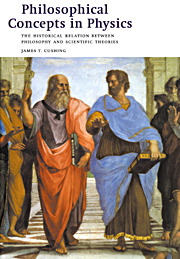
-
Select format
-
- Publisher:
- Cambridge University Press
- Publication date:
- June 2012
- January 1998
- ISBN:
- 9781139171106
- 9780521578233
- Dimensions:
- Weight & Pages:
- Dimensions:
- (247 x 174 mm)
- Weight & Pages:
- 0.73kg, 448 Pages
You may already have access via personal or institutional login
Book description
This book examines a selection of philosophical issues in the context of specific episodes in the development of physical theories. Advances in science are presented against the historical and philosophical backgrounds in which they occurred. A major aim is to impress upon the reader the essential role that philosophical considerations have played in the actual practice of science. The book begins with some necessary introduction to the history of ancient and early modern science, with major emphasis being given to the two great watersheds of twentieth-century physics: relativity and, especially, quantum mechanics. At times the term 'construction' may seem more appropriate than 'discovery' for the way theories have developed and, especially in the later chapters, the question of the influence of historical, philosophical and even social factors on the very form and content of scientific theories is discussed.
Reviews
‘For anyone who really wants to understand physics, this is a splendid and beautifully written book … this book is an excellent introduction to a historically based philosophy of science, with accurate reporting of many examples from physics, and much attention to primary sources. I would recommend it strongly as an adjunct to standard textbooks of physics for students who seek a real understanding of their subject.’
Michael Redhead Source: Physics World
‘… I think that Cushing has done an excellent job. If I again teach a course similar to his I will certainly consider using his book as a text …’.
Anthony Leggett Source: The Times Higher Education Supplement
‘As a chronological text in the history and philosophy of science for undergraduate students of the physical sciences, this book is unexcelled.’
J. Leplin Source: Endeavour
‘Altogether, the book provides a good overview of the basis underlying 3000 years of physical knowledge …’.
H Rechenberg Source: Institute of Physics Publishing
Contents
Metrics
Altmetric attention score
Full text views
Full text views help Loading metrics...
Loading metrics...
* Views captured on Cambridge Core between #date#. This data will be updated every 24 hours.
Usage data cannot currently be displayed.
Accessibility standard: Unknown
Why this information is here
This section outlines the accessibility features of this content - including support for screen readers, full keyboard navigation and high-contrast display options. This may not be relevant for you.
Accessibility Information
Accessibility compliance for the PDF of this book is currently unknown and may be updated in the future.


